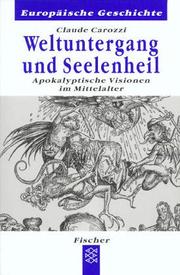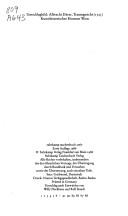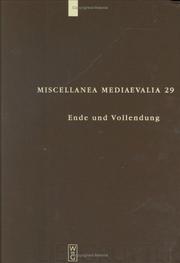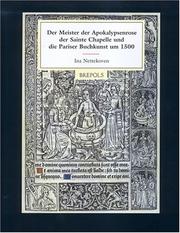| Listing 1 - 9 of 9 |
Sort by
|
Book
Abstract | Keywords | Export | Availability | Bookmark
 Loading...
Loading...Choose an application
- Reference Manager
- EndNote
- RefWorks (Direct export to RefWorks)
Mythology, Norse --- End of the world --- Mythologie nordique --- Fin du monde

ISBN: 3596601134 Year: 1996 Volume: 60113 Publisher: Frankfurt am Main Fischer
Abstract | Keywords | Export | Availability | Bookmark
 Loading...
Loading...Choose an application
- Reference Manager
- EndNote
- RefWorks (Direct export to RefWorks)
Apocalypse in literature --- Apocalypse in art --- Civilization, Medieval --- Church history --- Antichrist --- Fin du monde dans la littérature --- Fin du monde dans l'art --- Civilisation médiévale --- Eglise --- Antéchrist --- Histoire --- #GROL:SEMI-236.9 --- Fin du monde dans la littérature --- Civilisation médiévale --- Antéchrist
Book
ISBN: 379954254X Year: 2000 Volume: 3 Publisher: Stuttgart Thorbecke
Abstract | Keywords | Export | Availability | Bookmark
 Loading...
Loading...Choose an application
- Reference Manager
- EndNote
- RefWorks (Direct export to RefWorks)
Millennialism --- End of the world --- Eschatology --- Millénarisme --- Fin du monde --- Eschatologie --- History. --- Histoire --- Millénarisme --- ALLEMAGNE --- HISTOIRE --- MOYEN AGE --- POLITIQUE ET GOUVERNEMENT
Book
ISBN: 9783050047430 Year: 2010 Publisher: Berlin Akademie-Verlag
Abstract | Keywords | Export | Availability | Bookmark
 Loading...
Loading...Choose an application
- Reference Manager
- EndNote
- RefWorks (Direct export to RefWorks)
Christian religion --- Antichrist --- End of the world --- Antéchrist --- Fin du monde --- 236.92 --- Anti-Christ; Antichrist --- 236.92 Anti-Christ; Antichrist --- Antéchrist --- World, End of the --- Eschatology --- Christianity

ISBN: 3518385674 9783518385678 Year: 1986 Publisher: Frankfurt am Main Suhrkamp
Abstract | Keywords | Export | Availability | Bookmark
 Loading...
Loading...Choose an application
- Reference Manager
- EndNote
- RefWorks (Direct export to RefWorks)
Literature, Modern --- End of the world in literature. --- Littérature --- Fin du monde dans la littérature. --- Weltuntergang. --- Literatur. --- History and criticism. --- Histoire et critique. --- End of the world in literature --- History and criticism
Book
ISBN: 3525302215 9783525302217 Year: 2023 Publisher: Göttingen : Vandenhoeck und Ruprecht,
Abstract | Keywords | Export | Availability | Bookmark
 Loading...
Loading...Choose an application
- Reference Manager
- EndNote
- RefWorks (Direct export to RefWorks)
"World conflagration, flood or a simple aging and decay of the world - ancient authors dealt with concepts of the end of the world in various contexts and adapted them to their specific argumentative or poetic intentions. In doing so, one encounters a wealth of different ideas that are closely linked to the real everyday experiences of the recipients. Using a diachronic approach, the work examines which doomsday scenarios occur in which contexts and how they have been received and updated over the centuries. She places a particular focus on the questions of how early Christianity dealt with the pagan concepts of the end of the world, which elements of knowledge were used for their own positions and which representation mechanisms were used to make the concepts plausible for an early Christian target group"--
Apocalyptic literature --- End of the world in literature --- Greek literature --- Latin literature --- Classical literature --- Philosophy of nature --- History and criticism --- Themes, motives. --- History. --- Fin du monde --- Dans la littérature. --- Apocalypse in literature --- Apocalyptic literature. --- Christian literature, Early --- End of the world --- Fin du monde dans la littérature --- Floods in literature --- Greek literature. --- Jewish literature --- Latin literature. --- Littérature ancienne --- Littérature apocalyptique --- Littérature chrétienne primitive --- Littérature grecque --- Littérature juive --- Littérature latine --- History and criticism. --- History of doctrines --- Histoire et critique. --- Thèmes, motifs. --- 30-600
Book
ISBN: 9783895287473 3895287474 Year: 2010 Publisher: Bielefeld : Aisthesis-Verlag,
Abstract | Keywords | Export | Availability | Bookmark
 Loading...
Loading...Choose an application
- Reference Manager
- EndNote
- RefWorks (Direct export to RefWorks)
Écologie --- Fin du monde --- Littérature allemande --- Dans la littérature --- Histoire et critique --- Enzensberger, Hans Magnus, --- Critique et interprétation --- Ecology in literature. --- Apocalypse in literature. --- Technology in literature. --- Enzensberger, Hans Magnus --- Poetic works. --- Prose. --- Dans la littérature. --- Histoire et critique. --- Critique et interprétation. --- Littérature allemande --- Dans la littérature. --- Critique et interprétation.

ISBN: 3110172143 3111809013 3110875942 9783110172140 Year: 2002 Volume: 29 Publisher: Berlin de Gruyter
Abstract | Keywords | Export | Availability | Bookmark
 Loading...
Loading...Choose an application
- Reference Manager
- EndNote
- RefWorks (Direct export to RefWorks)
In the Middle Ages more than in other periods, eschatology informed the way people understood humankind and the world. The papers in the present volume are devoted to the complexity and interconnectivty of the eschatological orientation of the Middle Ages. Central topics are questions of the influence and formation of eschatological themes in philosophy and the significance of ideas of the final end in medieval political thought. In addition, there is a consideration of further themes from history, theology, art and literature. The 29th volume of the Miscellanea Mediaevalia contains the papers delivered to the 32nd Cologne Medieval Studies Conference plus additional contributions. The volume includes five papers on the 50-year history of the Thomas Institute, which has been organising the Cologne Medieval Studies Conference for the last half century. Stärker als in anderen Epochen prägte im Mittelalter die Eschatologie das Verständnis vom Menschen und der Welt. Die Autoren des vorliegenden Bandes widmen sich der eschatologischen Orientierung des Mittelalters in ihrer Vielschichtigkeit und ihren Wechselwirkungen. Schwerpunkte bilden hierbei Fragen nach dem Einfluß und der Gestaltung eschatologischer Motive in der Philosophie sowie nach der Bedeutung der Vorstellungen vom Ende im politischen Denken des Mittelalters. Daneben werden weitere Themen aus dem Bereich der Geschichtswissenschaft, der Theologie sowie der Kunst- und Literaturwissenschaften behandelt. Der 29. Band der Miscellanea Mediaevalia enthält die Vorträge der 32. Kölner Mediaevistentagung vom September 2000, erweitert um einige zusätzliche Beiträge. Fünf Aufsätze zur 50-jährigen Geschichte des Thomas-Instituts, seit einem halben Jahrhundert der Veranstalter der Kölner Mediaevistentagung, ergänzen diesen Band.
Eschatology --- Civilization, Medieval --- Congresses --- History of doctrines --- Congresses. --- Study and teaching --- #GOSA:II.P.AU.4 --- #GOSA:XX.III.D.Aeg-R.M --- Last things (Theology) --- Religious thought --- Theology, Doctrinal --- Medieval civilization --- Middle Ages --- Civilization --- Chivalry --- Renaissance --- History --- Universität zu Köln. --- Cologne. --- Thomas-Institut (Universität zu Köln) --- Middle Ages, 600-1500 --- Middle Ages, 500-1500 --- Eschatology - History of doctrines - Middle Ages, 600-1500 - Congresses. --- Civilization, Medieval - Congresses --- Civilization, Medieval - Study and teaching - Germany. --- Eschatologie --- Histoire --- Moyen age --- Thomas-Institut --- Fin du monde --- Doctrines religieuses

ISBN: 2503521959 9782503521954 Year: 2004 Volume: [9] Publisher: Turnhout Brepols
Abstract | Keywords | Export | Availability | Bookmark
 Loading...
Loading...Choose an application
- Reference Manager
- EndNote
- RefWorks (Direct export to RefWorks)
Geschiedenis van het boek --- Handschriften --- Histoire du livre --- Manuscrits --- Renaissance (art) --- Renaissance (kunst) --- Glass painting and staining, Gothic --- Illumination of books and manuscripts, Gothic --- Illustrated books --- History --- Sainte-Chapelle (Paris, France) --- 748 <44> --- 093.1 <44 PARIS> --- 091 <44 PARIS> --- 093:76 --- 76 <44> "15" --- 748 <44 PARIS> --- Glaskunst. Glazenierskunst. Kristalwerk--Frankrijk --- Incunabelen: bibliografie--Frankrijk--PARIS --- Handschriftenkunde. Handschriftencatalogi--Frankrijk--PARIS --- Incunabelen. Incunabelkunde-:-Grafische kunsten. Grafiek. Prentkunst --- Grafische kunsten. Grafiek. Prentkunst--Frankrijk--16e eeuw. Periode 1500-1599 --- Glaskunst. Glazenierskunst. Kristalwerk--Frankrijk--PARIS --- 76 <44> "15" Grafische kunsten. Grafiek. Prentkunst--Frankrijk--16e eeuw. Periode 1500-1599 --- 093:76 Incunabelen. Incunabelkunde-:-Grafische kunsten. Grafiek. Prentkunst --- 091 <44 PARIS> Handschriftenkunde. Handschriftencatalogi--Frankrijk--PARIS --- 093.1 <44 PARIS> Incunabelen: bibliografie--Frankrijk--PARIS --- 748 <44> Glaskunst. Glazenierskunst. Kristalwerk--Frankrijk --- Illumination of books and manuscripts, French --- Gothic illumination of books and manuscripts --- French illumination of books and manuscripts --- Gothic glass painting and staining --- Paris. --- Sainte Chapelle royal de Paris --- Glass painting and staining, Gothic - France - Paris --- Illumination of books and manuscripts, Gothic - France - Paris --- Illustrated books - History - 15th and 16th centuries --- Book history --- Master of the Rose Apocalypse of Sainte-Chapelle --- Fin du monde --- Paris (france) --- Art chretien --- Dans l'art --- Sainte-chapelle du palais --- France --- 15e siecle
| Listing 1 - 9 of 9 |
Sort by
|

 Search
Search Feedback
Feedback About UniCat
About UniCat  Help
Help News
News